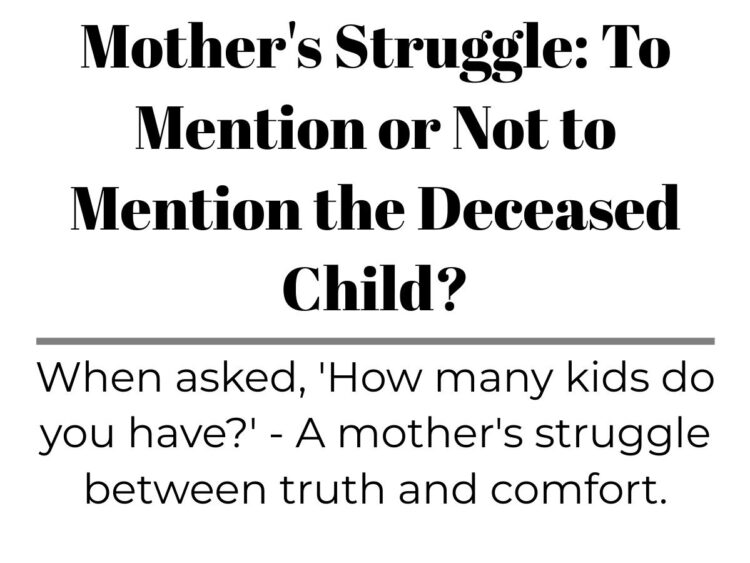A mother’s love knows no bounds, but what happens when that love is entwined with the unbearable pain of loss? This is a story about a mother who lost her eldest son in a tragic accident and is now wrestling with a heart-wrenching question: when asked how many children she has, should she include her deceased son? This dilemma has led to a family conflict, stirring up emotions and raising questions about grief, memory, and the social etiquette of discussing loss. Let’s delve into her story.
A Family Forever Altered

The Unspoken Truth

The Dilemma Unfolds

The Awkward Encounter

The Uncomfortable Question

The Unseen Memory

The Unavoidable Revelation

The Accusation

The Defense

The Argument

The Fallout

A Mother’s Struggle: Caught Between Truth and Comfort
This mother’s heart-wrenching story brings us face-to-face with the complexities of grief and the social etiquette of discussing loss. After losing her eldest son in a tragic accident, she finds herself caught in an emotional tug-of-war. Should she include her deceased son when asked about her children, potentially making others uncomfortable? Or should she keep his memory to herself, risking accusations of trying to erase him? This dilemma has led to a family conflict, stirring up emotions and raising questions about grief, memory, and the social etiquette of discussing loss. Let’s see what the internet thinks of this situation…
NTA. It’s okay to not mention deceased child when asked.

NTA – Protecting yourself by not constantly mentioning a deceased child

“To mention or not to mention” the deceased child? NAH, counseling suggested.

NAH. Grief is personal, and memories can be protective
![Image credit: [deleted] | [deleted]](https://static.diply.com/55a86546-9531-4704-a029-438d1aeb22f8.png)
NAH. Grieving differently, struggling with discomfort. Communication and counseling recommended.

Grieving mother shares her struggle of mentioning deceased child

NAH. Husband misunderstands, but it’s okay to wait to mention deceased child.
![Image credit: [deleted] | [deleted]](https://static.diply.com/f8f92179-4038-43df-aa65-0484c94cd7c4.png)
Grieving mother shares her struggle with mentioning deceased child.
![Image credit: [deleted] | [deleted]](https://static.diply.com/f8e52109-dd21-4a70-bf3e-04c4b4fd1e93.png)
NTA. Your choice to talk about your children is private.

Sharing the pain of losing a child and dealing with insensitive comments

Navigating the delicate balance of mentioning a deceased child ❤️
![Image credit: [deleted] | [deleted]](https://static.diply.com/97873e47-92d3-40e0-9c10-215cf75bf47b.png)
Protecting yourself vs honoring the memory NAH

Engaging with grief: When to mention a deceased loved one? ✨
![Image credit: [deleted] | [deleted]](https://static.diply.com/3c28708d-cb7d-4652-a24c-3fb7fda36337.png)
NTA. Sharing personal grief is a delicate balance.

Heartfelt stories of loss and remembrance, overcoming silence and stigma. ❤️

Navigating grief: Different ways to cope with the loss

NTA: A delicate balance between grief and communication with spouse.

Avoiding the awkwardness of talking about a deceased child. ♂️
![Image credit: [deleted] | [deleted]](https://static.diply.com/fb0728fc-ef30-408c-9856-4be9bc35c7ab.png)
Sharing my story of loss and navigating conversations about it

NTA. Share your son’s memory in your own way ❤️

Sensitive topic: NTA, it’s hard to discuss deceased child.

Lying about a deceased loved one to avoid emotional pain.

A mother’s personal choice to keep her deceased child private.

Respecting personal boundaries: NTA, it’s okay to not discuss it.

Supportive comment receives validation for not doing anything wrong. ✊

NTA. Husband doesn’t get it, you’re not erasing your son.

Honor your child in your heart, not in every conversation. ❤️

NTA – Husband’s insensitivity amplifies grief, creating an awkward dance.

Sharing about a deceased child can be difficult and situational.

Protecting your heart from grief: NTA, your story matters ❤️

Engaging comment: Coworker’s wife shares deceased child’s story with grace ❤️

Struggling with mentioning deceased child, but NTA for protecting self.

Dealing with people’s reactions when mentioning a deceased child

Personal choice: Discussing deceased child, in-laws crossing boundaries.

NTA. It’s painful, but your son is no longer here.

Choose when to mention the deceased child. NTA for that.

NTA. Coping with loss requires understanding and support.
![Image credit: [deleted] | [deleted]](https://static.diply.com/50bc95ac-68b0-41e5-9244-7b20a2dcb228.png)
NTA, prioritize your emotional well-being and seek professional help.

Parenting pains: Discussing deceased child with oblivious partner. Not the a**hole

NTA. Parent shares struggle of discussing deceased child with others.

Sharing personal tragedy repeatedly can be uncomfortable and degrading. NTA ❤️

Heartbreaking loss leads to protective silence.
![Image credit: [deleted] | [deleted]](https://static.diply.com/4c443529-c39d-4bb7-98bb-d454c49c95da.png)
Navigating the delicate topic of a deceased sibling with empathy

Engagingly sharing a mother’s approach to discussing her deceased child

Different grieving processes can strain relationships during times of tragedy.

Seek professional help to navigate this sensitive issue with spouse.

Heartfelt condolences for the loss of your son
![Image credit: [deleted] | [deleted]](https://static.diply.com/c22b414f-b09b-419e-84e8-ea8cff542f19.png)
NTA: Sharing personal experiences without bringing down the mood

Navigating grief: When to mention deceased loved ones

Engagingly, the commenter shares their experience and suggests a similar approach.

NTA. Coping with loss is personal. Don’t let others judge.

NTA. Share your personal history when you’re ready. Sorry for your loss.

NTA. Your loss, your trauma. Move on without feeling guilty.

NTA. Remembering your son should be your choice, not mandatory.

NTA for avoiding conversation about deceased child. Coping differences.
![Image credit: [deleted] | [deleted]](https://static.diply.com/60a52abc-b8da-47d8-818d-087cdd1d9fa2.png)
Engaging and respectful discussion on coping with loss and privacy.

Grieving parents choose not to mention deceased child, it’s understandable

Respecting individual grieving processes can be challenging for couples.

Sharing pain selectively: NTA wants to protect their heart

NTA – Protect your mental energy and keep conversations light
![Image credit: [deleted] | [deleted]](https://static.diply.com/34af5679-fece-40f2-8a7e-b03fc76c93ad.png)
It’s your choice how many kids you mention. No judgment here!

Navigating grief: Sharing or not sharing about a deceased sibling.

Engaging caption: A couple struggles to cope with the loss of their child.

Heartfelt comment about the struggle of mentioning a deceased child

“NTA My brother is dead and we don’t ‘count’ him, and that seems right for us”

NTA. Personal choice to share. Both grieving. Fertility issues uncomfortable.

NTA: Don’t let others dictate your grieving process. ♀️
![Image credit: [deleted] | [deleted]](https://static.diply.com/cbc03de4-fe28-4c80-ac2c-ff2feb4eb050.png)
Husband’s AH move backfires, leaving OP in the clear. ♀️


















































